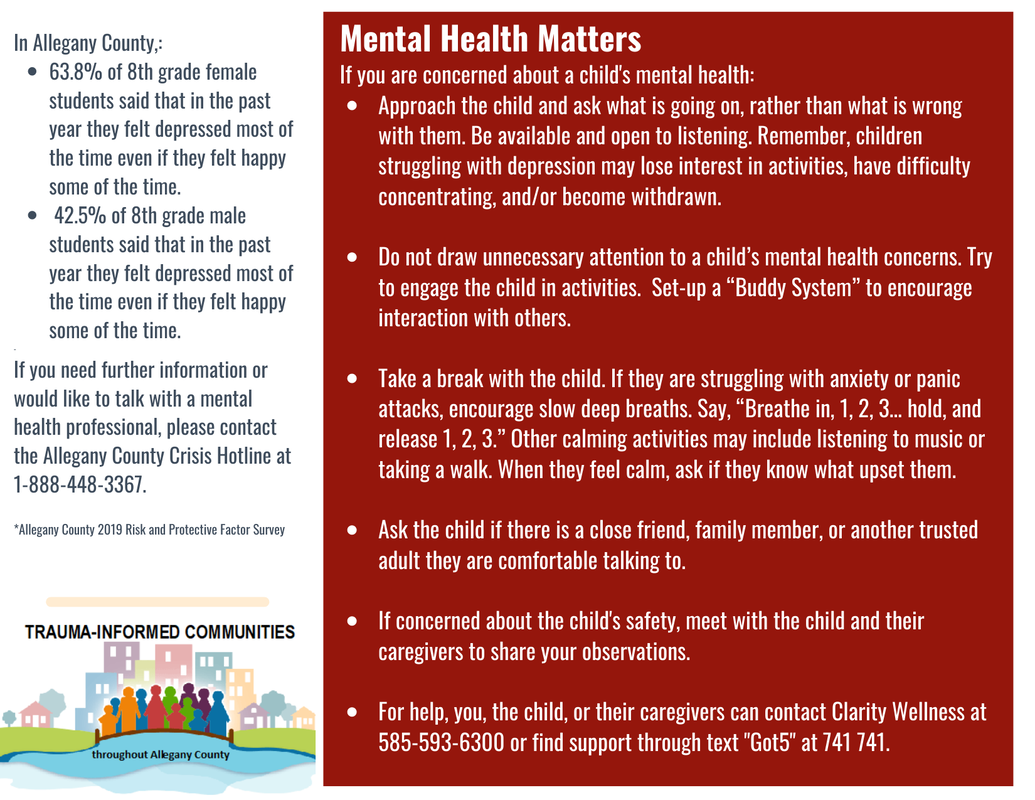- Home
- Trauma-Informed Education
- Trauma Overview
-
#onecaringadult
- #Onecaringadult Allegany County App
- #onecaringadult- Academic Stress
- #onecaringadult- Alcohol and Other Drugs
- #onecaringadult- Bullying
- #onecaringadult- LGBTQ+
- #onecaringadult- Childhood Neglect
- #onecaringadult- E-Cigarettes and Vaping
- #onecaringadult- Eating Disorders
- #onecaringadult- Mental Health
- #onecaringadult- Online Sexual Exploitation
- #onecaringadult- Non-Suicidal Self-Injury
- #onecaringadult- Sexual Abuse
- #onecaringadult- Sexually Transmitted Infections
- #onecaringadult- Suicide Prevention
- #onecaringadult- Teen Dating Violence
- #onecaringadult- Teen Pregnancy
- #onecaringadult- Toxic Stress
- #onecaringadult- Vaping & E-Cigarettes
- #onecaringfriend
- Trauma-Informed Resources
Teresa McMahon, Local Therapist
Mental health — an essential part of children's overall health — has a complex interactive relationship with their physical health and their ability to succeed in school, at work and in society. Both physical and mental health affect how we think, feel and act on the inside and outside. An estimated 15 million of our nation's young people can currently be diagnosed with a mental health disorder. Many more are at risk of developing a disorder due to risk factors in their biology or genetics; within their families, schools, and communities; and among their peers. There is a great need for mental health professionals to provide the best available care based on scientific evidence, good clinical expertise, and that takes into account the unique characteristics of the child or adolescent. However, it is estimated that only about 7 percent of these youth who need services receive appropriate help from mental health professionals (Dept of Health and Human Services, 2001 — Report of the Surgeon General’s Conference on Children’s Mental Health: A National Action Agenda).
Source: American Psycholological Association
WHAT YOU NEED TO KNOW
|
Recognizing Mental Health Issues
Warning signs that your child may have a mental health disorder include:
Source: Mayo Clinic
|
Learn More About Children's Mental Health
|
|
Types of Mental Health Disorders
Mental health disorders in children — or developmental disorders that are addressed by mental health professionals — may include the following:
Anxiety Disorder
Anxiety disorders in children are persistent fears, worries or anxiety that disrupt their ability to participate in play, school or typical age-appropriate social situations. Diagnoses include social anxiety, generalized anxiety and obsessive-compulsive disorders. Attention-deficit/hyper activity disorder
Compared with most children of the same age, children with ADHD have difficulty with attention, impulsive behaviors, hyperactivity or some combination of these problems. Autism Spectrum Disorder
Autism spectrum disorder is a neurological condition that appears in early childhood — usually before age 3. Although the severity of ASD varies, a child with this disorder has difficulty communicating and interacting with others. Eating Disorders
Eating disorders are defined as a preoccupation with an ideal body type, disordered thinking about weight and weight loss, and unsafe eating and dieting habits. Eating disorders — such as anorexia nervosa, bulimia nervosa and binge-eating disorder — can result in emotional and social dysfunction and life-threatening physical complications. Depression and other mood Disorders
Depression is persistent feelings of sadness and loss of interest that disrupt a child's ability to function in school and interact with others. Bipolar disorder results in extreme mood swings between depression and extreme emotional or behavioral highs that may be unguarded, risky or unsafe. Post-Traumatic Stress Disorder
PTSD is prolonged emotional distress, anxiety, distressing memories, nightmares and disruptive behaviors in response to violence, abuse, injury or other traumatic events. Schizophrenia
Schizophrenia is a disorder in perceptions and thoughts that cause a person to lose touch with reality (psychosis). Most often appearing in the late teens through the 20s, schizophrenia results in hallucinations, delusions, and disordered thinking and behaviors. Source: Mayo Clinic
|
Helpful Links
Learn About Children’s Mental Health | CDC
A Guide to Children's Mental Health Children and Mental Health: Is This Just a Phase Children and Adolescents Mental Health Early Childhood Mental Health New York State Office of Mental Health MentalHealth.gov Supporting Children's Mental Health Clarity Wellness Community |
- Home
- Trauma-Informed Education
- Trauma Overview
-
#onecaringadult
- #Onecaringadult Allegany County App
- #onecaringadult- Academic Stress
- #onecaringadult- Alcohol and Other Drugs
- #onecaringadult- Bullying
- #onecaringadult- LGBTQ+
- #onecaringadult- Childhood Neglect
- #onecaringadult- E-Cigarettes and Vaping
- #onecaringadult- Eating Disorders
- #onecaringadult- Mental Health
- #onecaringadult- Online Sexual Exploitation
- #onecaringadult- Non-Suicidal Self-Injury
- #onecaringadult- Sexual Abuse
- #onecaringadult- Sexually Transmitted Infections
- #onecaringadult- Suicide Prevention
- #onecaringadult- Teen Dating Violence
- #onecaringadult- Teen Pregnancy
- #onecaringadult- Toxic Stress
- #onecaringadult- Vaping & E-Cigarettes
- #onecaringfriend
- Trauma-Informed Resources
